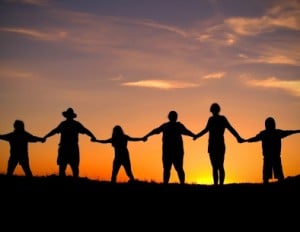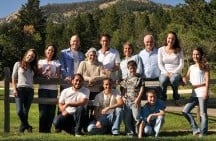The Cost of Belonging
 December 18 Mike and I packed his Saab station wagon with food, clothes, fishing rods, gifts, and Fred the dog, and set out for the shores of the Gulf of Mexico for the annual Christmas gathering of my extended family.
December 18 Mike and I packed his Saab station wagon with food, clothes, fishing rods, gifts, and Fred the dog, and set out for the shores of the Gulf of Mexico for the annual Christmas gathering of my extended family.
The trip cost us a chunk of change in gas, tolls, and hotels, plus some wear and tear on the nervous system due to, shall we say, interpersonal challenges within the extended family. But we gladly sacrificed because belonging comes at a price.
The need to belong tugs at every heart because God designed us to function on the basis of intimate relationship, to love and be loved. He derived this design from Himself, for from eternity, the original family of Father, Son and Spirit lived in intimate closeness. “God is love,” not just in the sense of love extending from God, but love within God, between the Father, Son and Spirit. The very nature of God is love, with or without His creation.
But then God did create, and He created us like Him.
Because of our God-likeness, we posses, not just a capacity for love, but a demand for it. When our need is met, we thrive; when it remains unmet, we fail to thrive. Neuroscience screams this out to us in various studies, from the ones that show how children raised in a nurturing environment have higher IQs, to those that correlate loneliness with heart disease and cancer. Belonging entwines itself in the spiral-ladders of our DNA, reaching out in tendrils of longing from our cores.

Family
We want to belong. We need to belong. So how to belong becomes the question. Clearly the human race fails at it. Strife lashes out everywhere, from the interpersonal to the global scale. We find ourselves, “hateful and hating one another” one description attests (Titus 3:3); another describes human beings as “alienated and enemies in your mind,” (Colossians 1:21). A quick perusal of the daily news validates these assertions.
So here we sit, alienated from one another and from God, opposed to the very need engraved on our DNA. We can’t extricate ourselves without a Savior. But qualifying Himself to save us cost Jesus something. The human race, under Adam, orphaned itself through sin and only through a new Representative, a second or “last Adam” (1 Corinthians 15:45), could we gain entrance into the heavenly courts. Jesus qualified Himself to become the last Adam by first joining the sinful race and then atoning for its sins on the Cross. This was the cost of our belonging.
Have you ever noticed the triadic expressions throughout the Bible?
“The Lord bless you and keep you;
“the Lord make His face shine upon you, and be gracious to you;
“the Lord lift up His countenance upon you, and give you peace.” Numbers 6:24-26.“Holy, holy, holy is the Lord of hosts!” Isaiah 6:3
“O Lord, hear!
“O Lord, forgive!
“O Lord, listen and act!” Daniel 9:19
O Lord, O Lord, O Lord . . . Holy, holy, holy . . . these three-part exclamations punctuate the Old Testament, becoming more precise in the New, identifying not just the number, but the specific persons of Father, Son and Spirit in God (See 1 Cor. 12:4-6, 2 Cor. 13:14, 2 Thess. 2:13, 2 Thess. 2:13 and 1 Peter 1:2).
But a different kind of cry ascends from Jesus when on the Cross He takes upon Himself our alienated condition. He cries, “My God, My God, why have You forsaken Me?”
My God
My God
Two instead of three. Baggaged with our sin, He finds Himself outside the circle, outside His eternal home, outside of belonging.
The inseparable Trio of love, fractured. Father looking down in woe, present but not perceived, Spirit moaning with cries too deep to be uttered, Jesus orphaned and outcast, forlorn and despairing, the traumatic assault sufficient to make His internal organs to boil over in terminal grief.
The cost was commensurate with that which He bought. He bought belonging for us. He paid with His own belonging. In Christ, we belong to the most elite family in the universe, soon to ascend with Him when He comes again.
Time to pack for the journey.
